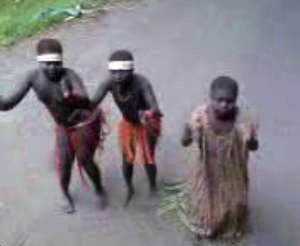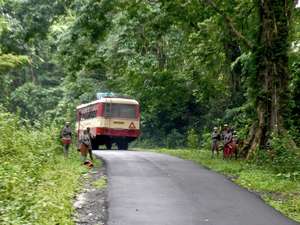by
yerry
—
We interview Arvind Raj, a video journalist working
with Free Malaysia Today, one of the country's most popular independent
online news portals.

Name: Arvind Raj
Age: 36Location: Kuala Lumpur, Malaysia
1. Tell us who you are as a filmmaker.
I am more of an activist filmmaker than a commercial filmmaker - I feel the subject, the issues deep in side the heart before making an effort to create a film or video.
2. Why did you decide to work with the moving image?
Video is the best tool for showing evidence of what really happened in any situation. No one can deny or manipulate the issue or the incident once it is recorded in a genuine way.
3. What radicalised you as a filmmaker? Did it happen in the moment, or was it a process?
I became a filmmaker not by choice but by chance - I participated in many street demonstrations and protests to fight against injustices and to give a voice to the voiceless, but without a medium such as video I couldn't explain a lot of the incidents because I am not a good writer.
I created a blog and updated it frequently from the scene where marginalised people were being bullied. I took photos and videos from my mobile phone to show this. Later, I attended the Citizen Journalism training by the International Centre for Journalists (ICFJ) and progressed from there.
4. As a videomaker, what are the challenges of working in Malaysia? What are the restictive laws?
A general challenge is that journalists and videomakers do not have immunity or security in this country. If the authorities feel that it is not safe for us to film something, they will go all out to stop you from filming. Arresting us for no reason is a way for them to stop us, especially in the street demonstrations where the police brutality can be seen in an open space.
5. What are the main issues you address in your video work?
The issues that I have highlighted in my videos all relate to human rights: poor and marginalised society, the transgender plights, demolishing the poor heritage villages, estate-worker issues, the promises made by some politicians and the disappointment they engender.
6. Tell us about your favourite piece of video you have made, in regards to social justice or the environment.
 I did a video called GATCO - 33 Years of Dreams Shattered,
on the plight of estate workers in Negeri Sembilan (which is a 2 hour
drive from Kuala Lumpur). The victims are poor Indian estate workers who
have been working on a piece of land for more than 36 years, believing
that they will own the land one day. However, to their dismay, the land
was recently bought by a private company through an auction. State and
federal governments failed to help them despite making past promises of
help, during elections, in order to win their votes.
I did a video called GATCO - 33 Years of Dreams Shattered,
on the plight of estate workers in Negeri Sembilan (which is a 2 hour
drive from Kuala Lumpur). The victims are poor Indian estate workers who
have been working on a piece of land for more than 36 years, believing
that they will own the land one day. However, to their dismay, the land
was recently bought by a private company through an auction. State and
federal governments failed to help them despite making past promises of
help, during elections, in order to win their votes. 7. How do you think online distribution is changing the field of independent video making? How do you use online tools in your work?
Let's compare it with several years ago when the internet was not widespread in Malaysia. People believed what they saw in the mainstream media - for them that was news and that was the most trustworthy medium - but now it has changed.
People realise that mainstream media is merely a tool of the political party that governs the nation. People tend to compare the news in the mainstream media with online media, which is also known as alternative media. They know that not everything that is shown in the mainstream media is accurate. We have many tools, sites and online platforms to share, spread and distribute the videos that we make.
EngageMedia, YouTube, Free Malaysia Today, Papuan Voices and Komas are some of the platforms available to highlight our issues as an independent filmmaker. If a video is made in any foreign languages or dialects, tools such as universal subtitles help to spread the message. Anyone in the network can contribute the subtitles, which helps further distribution of the issues.
8. Tell us more about the role of video in this coming elections, and how film/videomaker can contribute to this democratic process?
 As a filmmaker for Free Malaysia Today,
I have the advantage of publishing videos of interviews, speeches and
peoples' opinions from both parties; the ruling government party and the
opposition party, together with the independent candidate. These kinds
of videos cannot be seen in any mainstream media.
As a filmmaker for Free Malaysia Today,
I have the advantage of publishing videos of interviews, speeches and
peoples' opinions from both parties; the ruling government party and the
opposition party, together with the independent candidate. These kinds
of videos cannot be seen in any mainstream media. We are giving a clear picture of the political scenario in Malaysia for people to evaluate the political parties' genuineness, sincerity, contribution and manipulations. We are fair in reporting both angles, although sometimes we lean more towards the opposition activities to balance their limitations in mainstream media coverage.


 A
spokesperson for the group, M Asogan, said that Waythamoorthy had
“pawned the self-respect and dignity of the Indians to Umno merely for
his own interest”.
A
spokesperson for the group, M Asogan, said that Waythamoorthy had
“pawned the self-respect and dignity of the Indians to Umno merely for
his own interest”. “The
Indians in Malaysia will never forgive Waythamoorthy for betraying the
trust of these marginalised and sidelined Indians,” he said after the
protest held by about 500 people in Paya Besar.
“The
Indians in Malaysia will never forgive Waythamoorthy for betraying the
trust of these marginalised and sidelined Indians,” he said after the
protest held by about 500 people in Paya Besar. Waythamoorthy
incurred the wrath of some of his supporters when he signed a
memorandum of understanding (MOU) with Najib in April, asking them to
return BN’s
Waythamoorthy
incurred the wrath of some of his supporters when he signed a
memorandum of understanding (MOU) with Najib in April, asking them to
return BN’s  “But
little did he realise that many MOU appeals have been submitted to the
Umno-BN government by various parties in the past, including MIC, and so
far, none have materialised,” said Asogan.
“But
little did he realise that many MOU appeals have been submitted to the
Umno-BN government by various parties in the past, including MIC, and so
far, none have materialised,” said Asogan. He
had “criticised and condemned” the Hindu religion, saying Malaysia does
not belong to the community and they should return to India, Asogan
claimed.
He
had “criticised and condemned” the Hindu religion, saying Malaysia does
not belong to the community and they should return to India, Asogan
claimed.
